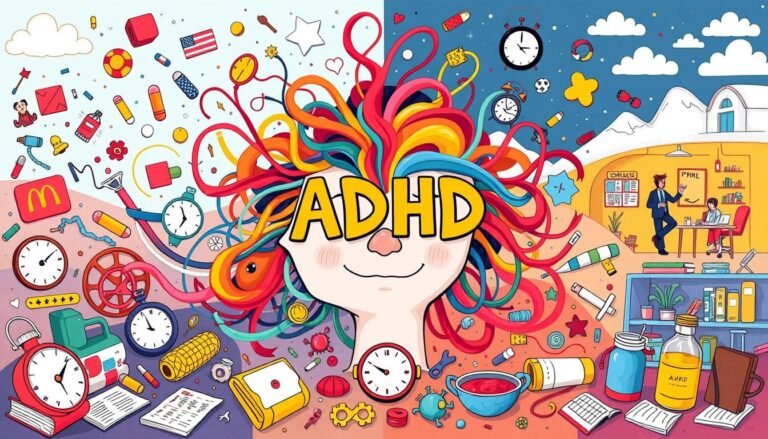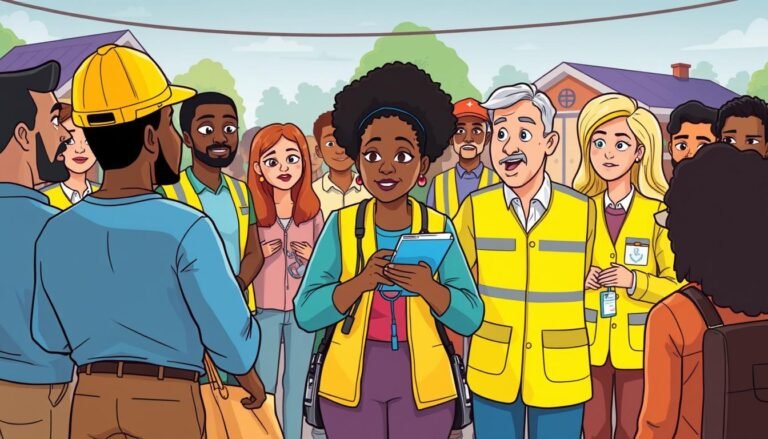Supporting Irish Families Navigating Mental Health Challenges
Years ago, a friend told me her story. She was caring for her sibling with severe depression. I learned about her endless nights, seeking ways to give emotional support. She also went to therapy sessions and dealt with her stress. Her story showed the big task she had taken up. But, love and purpose were her motivation.
Her experience isn’t unique in Ireland. Studies say about 182,884 people in Ireland care for their relatives with mental health problems. This story is just one of many.
In Ireland, family carers get special recognition for their important work. They provide a lot of help to their loved ones. The “Family Recovery Guidance Document 2018-2020” outlines how to aid these families.
Plus, laws like the Care Act 2014 in England, and also Ireland’s supports, help carers with money and care. They’re doing this to help lessen the burden on family carers.
Places like Shine.ie, Aware.ie, and Bodywhys.ie are crucial. They provide resources and support for family carers in mental health. For example, there’s an initiative called the Relatives & Friends Programme. It offers 90-minute sessions over four weeks. These sessions aim to help family carers learn the best ways to support their loved ones. Also, the program is available in-person and online, which makes it easier for everyone to join.
Family carers in Ireland save the state around €4 billion yearly through their unpaid work. This number shows how much they give, not just in money but in emotion and society. Luckily, there are support systems like family counseling and community programs. These are making a real difference in their lives.
Key Takeaways
- National policy in Ireland acknowledges the essential role of family carers in mental health support.
- Financial and emotional aids are legislated to assist family carers.
- Organizations such as Shine.ie, Aware.ie, and Bodywhys.ie offer valuable mental wellness resources in Ireland.
- The Relatives & Friends Programme equips family carers with important skills through accessible 90-minute sessions.
- Carers save the Irish state approximately €4 billion annually through their efforts.
Understanding Mental Health in Ireland
Mental health in Ireland has changed a lot over time. People used to think those with mental health issues were weak. But now, we know that facing these challenges shows strength and resilience.
There’s a better understanding that many things affect mental health, like race, class, and gender. This new awareness is creating more support and understanding in communities.
Historical Perspective
In the past, people kept mental health issues secret due to shame and fear of being judged. This was especially true in places like work, school, and college. Over time, education and promotion have helped to break the silence. This allows people to talk openly and seek help without worrying about others’ opinions.
Current Mental Health Landscape
Today, mental health support in Ireland is better, but there’s still work to do. Employers are starting to make workplaces more mental health-friendly. Schools and colleges are also teaching about mental health, even though some feel they’re not doing enough.
The Covid-19 pandemic worsened mental health, especially for women and those who are main carers. More help is needed across the country. This shows just how important it is to have easy access to mental health support.
Role of Legislation
In Ireland, laws aim to fight mental health stigma and protect people from being treated unfairly. These laws help raise awareness and provide money for mental health services. With support from the government, these services can better serve everyone in Ireland.
By making and enforcing these laws, we make mental health support better for everyone in the country. Good laws help create a more equal and caring mental health system for Ireland.
Family Mental Health Support Resources
In Ireland, many groups aim to help families with mental health concerns. About 20% of adults in the Republic of Ireland face these issues. It’s key to find the best support. We’ll look at top options on Shine.ie, Aware.ie, and Bodywhys.
Shine.ie Services
Shine.ie has special programs for both families and individuals dealing with mental health problems. They teach about mental health in a family setting. This helps families handle these issues better. Key services include:
- Educational workshops to boost understanding of mental health problems.
- Therapy for individuals and families.
- Access to mental health support groups for patients and their families.
These services help families understand and manage mental health problems. They create a positive place for people to heal and thrive.
Aware.ie Programs
Aware.ie has many services for those with depression and bipolar disorder. They care for individuals and families alike, offering:
- Group meetings acting as mental health support groups for sharing and support.
- Efforts to fight stigma and inform the public.
- The ‘Relatives and Friends Program,’ teaching caregivers how to best help their loved ones.
These steps reduce family stress and boost mental health in Ireland.
Bodywhys Support
Bodywhys helps those with eating disorders, valuing family support. They provide:
- The ‘Family, Carer and Supporter Guide’ with resources and advice.
- Family support that may include therapy.
- Mental health services Ireland for patients and caregivers to recover well.
Bodywhys shows how important it is for families to work together against eating disorders. Family support and education are key.
With help from Shine.ie, Aware.ie, and Bodywhys, Irish families can deal with mental health challenges better. They make sure there’s a caring, informed space for their loved ones.
Accessing Irish Family Counseling Services
Fighting mental health issues can be tough, requiring useful and easy-to-find help. In Ireland, a range of services steps up to support families facing a crisis. The Health Service Executive (HSE) is a key name in offering Irish family counseling. You can reach out via various paths. Plus, there are community schemes that focus on giving mental health help that’s personal and nearby.
HSE Services
The HSE doesn’t just offer Irish family counseling; it has a full lineup of services for various needs too. They offer everything from sessions on family therapy to care right at your home. They have a special guide for families, carers, and supporters with loads of info on coping strategies and ways to help yourself. The HSE believes in a full wellness approach, which highlights the importance of keeping every family member’s mental health in check.
Community-Based Programs
Besides what the HSE does, there are community resources scattered all over Ireland that widen the net of support. This includes programs like social prescriptions. Their job is to cut down on feeling left out and boost mental health by linking people with local happenings and supports. For kids and teens, places like Jigsaw and Childline are there to offer help and mental health tips. BeLonG To Youth Services, on the other hand, offers specific help for LGBTI+ youth along with group activities.
In addition, groups like Barnardos, CARI, and ALONE focus on specific services for different groups. This mix of services ensures that every family can get the help they need. There’s plenty of community mental health help available, letting families get support that really fits their mental health challenges.
Supporting Youth Mental Health in Ireland
The number of young people in Ireland facing mental health issues is going up. It’s crucial to take action and support them. Y outh mental health Ireland is working on several programs to help these youth.
Challenges Faced by Young People
Many young people in Ireland are struggling with their mental health. A large number show signs of depression and anxiety. Some have even hurt themselves or thought about suicide. These numbers are very worrying.
Sadly, suicide is the top cause of death for young people in Ireland. This shows us how serious mental health is for the youth. We need to do everything to help them.
Resources for Children and Teens
Different places offer help for kids and teens to deal with mental health. Barnardos.ie, for example, has helpful booklets. These books aim to help young people understand mental illness in their family. It’s important that kids know what’s going on and feel supported.
School-Based Initiatives
School mental health programs can make a big difference. They try to teach students about mental health. But, they need more mental health experts to help out. We want to make schools better at supporting youth with their mental health.
Navigating Mental Illness Challenges
Navigating mental illness challenges within the family can be tough. Learning about common Irish mental health issues is key. So is getting help for mental health problems early. This makes a big difference in how well someone copes.
Also, family support can really help those with mental health issues.
Common Mental Health Issues
Many in Ireland face anxiety, depression, and eating disorders. Studies show how tough it is for teens. Half had big symptoms of depression. Two-thirds felt extreme anxiety. Many also had severe stress and possible eating disorders.
A special program called High-Fidelity Wraparound (HFW) helps children and teens. It’s for those with deeply troubling mental health issues. This program shows the need for serious help.
Importance of Early Intervention
Starting help early for mental health is very important. It can really help in the long run. Shine, Ireland’s top mental health group, offers a unique recovery plan. It’s for people with tough mental health issues like schizophrenia.
Work can add a lot of pressure, making parents very tired. This can hurt kids’ mental health. Shine offers help for parents. It includes one-on-one planning, group support, and learning programs.
Strategies for Family Support
Family help is crucial for mental health problems. It’s key for families to know and push for the right help. Shine works hard to connect families and beat the stigma around mental health.
Shine’s See Change program has over 50 trained Ambassadors. They share their stories to reduce stigma. The Green Ribbon campaign helps spread awareness too.
Families with serious needs can get help from the HFW program. They meet for a plan every month or sooner if needed. This way, they get support that fits their situation.
Helping families with mental health means using all kinds of support. Teaching, speaking up, and using programs all work together. This helps families create a strong and supportive space for those dealing with mental illness.
Postpartum Depression Support Ireland
Around 10% to 15% of new mothers in Ireland face postpartum depression. This shows the need for strong maternal mental health resources. These resources are crucial to help these women get through a difficult time.
Understanding Postpartum Depression
Postpartum depression is more than just feeling down after having a baby. It includes moderate to severe symptoms of depression. 14% of women in the first year after childbirth report these symptoms.
Additionally, around 9.5% of women feel moderate to severe anxiety. One in five women experiences stress. Age, country of birth, living situation, education, and unemployment during pregnancy can affect these experiences.
Available Support Services
Unfortunately, not all maternity units and hospitals in Ireland offer perinatal mental health services. But new resources are coming up to fill this gap. They provide important help for new mothers’ mental health.
- Samaritans24hr Listening Service: This support line sees many who need help. It shows the big demand for listening and support.
- Parentline: This service is another great help. It focuses on listening and support for mothers facing challenges after giving birth.
Support groups and activities play a big role. Many new mothers join these for emotional support. They often find understanding and help from other mothers. Also, more and more women are looking for help online. This shows that maternal mental health resources are changing and growing.
“It is heartening to see that approximately 70% of women manage their postpartum depression successfully with treatment. However, awareness and access to these critical services must be expanded.”
Doctors and other healthcare professionals are key in helping. They often connect new mothers to mental health services. This is very important because maternal suicide is a top cause of death after pregnancy in Ireland and the UK. More support and knowing where to get help can make a big difference.
Addiction Recovery Ireland
Substance abuse and addiction are big issues in Ireland. Recovery means dealing with many types of addictions. It involves offering special help and tools to those in need. Families play a key part in helping addicts recover. They provide important support and help create a good atmosphere for change.
Types of Addictions
In Ireland, substance abuse support helps with alcohol and drug addictions. About 5% of adults depend on alcohol, and an additional 7% misuse it. This problem is worsened by Ireland’s high alcohol consumption per person. Marijuana use is also on the rise. Warning signs include not being able to stop using, strong desires for the substance, always needing it, and risky actions when using.
Recovery Programs and Resources
Different groups in Ireland aid with addiction treatment services, like Alcoholics Anonymous. They also include AWARE and Gamblers Anonymous. St Patrick’s Mental Health Services offer a wide range of treatment options. These include outpatient, inpatient, and aftercare services. The Temple Centre emphasizes holistic care. The Dean Clinic focuses on personal therapy. Custom programs help a lot. For example, people who stop using alcohol for a few weeks see their mood greatly improved. Dual diagnosis care addresses both mental health and addiction issues.
Role of Family in Recovery
Family is essential in addiction recovery. Proper family support addiction recovery is key. It creates the needed supportive setting for recovery. Family members help a lot. They provide emotional backing and push for sticking to treatment. Recovery is a team effort. It involves everyone working together to beat addiction.
Grief Counseling Ireland
Grief counseling is crucial for those dealing with loss. Knowing when to get help is key to healing. In Ireland, many resources are available to help families and individuals. They offer support in working through grief with care and understanding.
When to Seek Grief Counseling
Finding the right time for grief counseling can be tough. It’s essential if you’re feeling sad for a long time, find it hard to do daily tasks, or if your emotional pain never eases. It’s especially important for those dealing with complex losses, like trauma, sudden deaths, or the loss of a child. In Ireland, there’s caring bereavement support for everyone who needs it.
Resources and Services
Ireland has many grief counseling services that provide different types of support:
- The Irish Hospice Foundation Bereavement Support Line: You can call their freephone number, 1800 807 077, from 10am to 1pm, Monday to Friday, for support.
- Barnardos Helpline: They offer help and information to children and families on weekdays, between 10am and 12pm. You can reach them at 01 473 2110.
- Childline (ISPCC): They have a 24/7 service for young people up to 18. You can call them at 1800 666 666 or text from 10am to 4pm, daily, at 50101.
- Pieta House: For those impacted by suicide, they offer free counseling and support. Call 1800 247 247 or text HELP to 51444.
- Samaritans: Need someone to talk to? They’re available any time. Call 116 123 for free, or email at jo@samaritans.ie.
- Text About It: This service, reachable by texting HELLO to 50808, is open 24/7 for mental health support.
- Anam Cara: They help bereaved parents with information and community events. Visit anamcara.ie to learn more.
- Féileacáin: For those who lost a baby, they offer support through feileacain.ie.
- A Little Lifetime Foundation: They provide help and info for parents and families who lost a child. Visit alittlelifetime.ie for more.
You can also find help from private counselors and therapists focused on grief and bereavement. You might go through your GP, the National Counselling Service (NCS), or find them privately with groups like the Irish Association for Counselling and Psychotherapy (IACP).
Conclusion
Ireland has a big challenge with mental health. It’s ranked fourth in the EU for suicide by the World Health Organization. Mental health struggles are a major cause of being unable to work. This shows that Ireland needs to have strong ways to deal with mental health and help its people.
In the past, Ireland mainly used institutions to help with mental health. But things have changed a lot. Now, there are places like Pieta House and Aware that offer important help. Ireland is working hard to make its mental health care better for everyone.
There are also new ways to use technology to help with mental health. Things like online therapy and phone apps are making a big difference. Ireland is trying to make sure everyone can get the mental health support they need. The goal is to make mental health support a big part of the country’s values.
FAQ
What resources are available for family mental health support in Ireland?
In Ireland, you can find support from organizations like Shine.ie, Aware.ie, and Bodywhys.ie. They offer programs and advice. The HSE also helps with family therapy and care at home.
How has the perception of mental health evolved in Ireland?
The way people see mental health in Ireland is changing. It used to be kept quiet. But now, talking openly about it is becoming more common. This has helped to reduce shame and stigma.
What role does legislation play in mental health support in Ireland?
The laws in Ireland are working to protect and help with mental health issues. They aim to stop discrimination and make sure resources are available. This includes better policies and funding for services.
What services does Shine.ie provide?
Shine.ie helps people and families dealing with mental health problems. They have guides, support groups, and one-on-one help. All this support is meant to make caregivers stronger.
How can families access mental health support through the HSE?
Families in Ireland can get mental health help from the HSE. They offer family therapy and care at home. There’s also a guide for families with advice and strategies to help with mental health.
What challenges do young people in Ireland face regarding mental health?
Young people in Ireland often deal with mental health issues like anxiety and depression. Places like Barnardos.ie are there to explain these issues to children. Schools and more mental health support workers are needed to help.
Why is early intervention important for mental health?
Starting mental health help early makes a big difference. It makes treatment more effective, helping people recover better. Addressing mental health problems soon also means they are easier to manage.
What support is available for postpartum depression in Ireland?
Ireland has many services for mothers with postpartum depression. These include treatments, groups, and resources. They aim to help both mothers and their families.
What are the types of addictions, and how can one seek recovery in Ireland?
Addictions can be to substances or behaviors. Ireland has many groups that help with recovery. They stress that family support is crucial for changing habits and lifestyles.
When should someone seek grief counseling, and what resources are available?
If someone is deeply affected by loss, seeking grief counseling is wise. Ireland has many resources, including bereavement support. They offer counseling services to help people and families through their grief.
Source Links
- Family Recovery Interventions with Families of Mental Health Service Users: A Systematic Review of the Literature
- Relatives & Friends Programme | Positive Mental Health | Aware
- Navigating Mental Health Stigmas in Ireland in 2024: Toward Understanding and Breaking Barriers
- Mental health in Ireland during the Covid pandemic: Evidence from two longitudinal surveys
- Minority Mental Health Awareness in Ireland
- Frontiers | The Family Talk Programme in Ireland: A Qualitative Analysis of the Experiences of Families With Parental Mental Illness
- Support Services| National FRC Mental Health Promotion Project
- Mental Health Resources for Parents and Caregivers
- Mental health supports and services
- Mental health services for children and young people in Ireland
- The Family Talk Programme in Ireland: A Qualitative Analysis of the Experiences of Families With Parental Mental Illness
- Helping parents support youth mental health
- Navigating Mental Health with CBH’s Transformative High-Fidelity Wraparound Program – Community Behavioral Health
- About Shine | Supporting People Affected By Mental Ill Health
- Significant mental health challenges experienced by Ireland’s young LGBTQI+ population: report
- Postnatal depression – getting help
- Reality of maternal mental health for first time mums in Ireland: study
- Maternal mental health in the first year postpartum in a large Irish population cohort: the MAMMI study
- The Addictions Service – St Patrick’s Mental Health Services
- How to access rehab with health insurance – Smarmore Castle
- Bereavement supports and services
- Grief encounters: Karen Docherty tells her story of losing both her sons to suicide
- Bereavement counselling and support services
- Mental health and the Irish
- Family Carer and Supporter Guide








